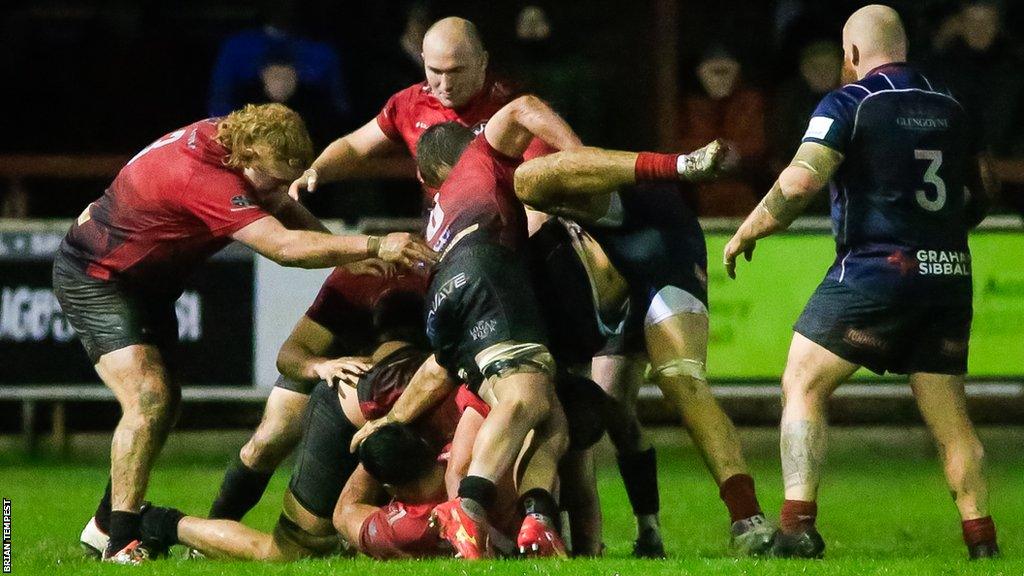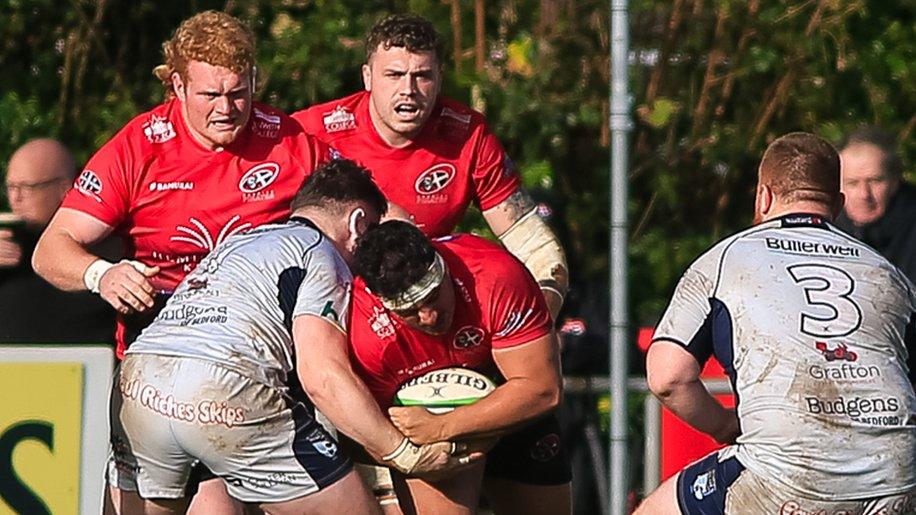Championship clubs claim RFU 'relegation threat' over new league proposals
- Published

Cornish Pirates and London Scottish are among the sides competing in the Championship this season
English Championship rugby union clubs say the Rugby Football Union (RFU) has "threatened them with effective relegation" over their objections to plans for a new second tier.
The 11 clubs rejected the RFU's franchise-based model in November.
Under the plans clubs would have to apply for a place to play in a new-look second tier from the summer of 2025.
Clubs are against "non-meritocratic entry" to a new league and have doubts over how promotion would work.
"Rather than seek to discuss these objections and others, the RFU has chosen to threaten us with effective relegation to the National Leagues for non-compliance, while ignoring the unresolved questions on governance, commercial strategy, promotion/relegation, player welfare and the player development pathway," a statement from the 11 Championship clubs said.
"We have offered alternative proposals on the way forward to the board without response.
"The current RFU plan to present any recommendation to council is extremely premature, until such fundamental issues are addressed and consensus reached so that the game can move forward via agreement rather than ultimatum.
"We would appeal to council not to approve any plans for Tier 2 until our proposals are discussed in detail and there is full clarity on these fundamental issues."
In response, the RFU said it had been consulting with Championship clubs for "over a year" and hoped they would "choose to be part of what could become a more thriving and sustainable second professional tier".
It added: "We have researched and produced a commercial strategy and provided the clubs with confirmed funding at at least existing levels for the 2024-25 season, and proposals for increased funding from the 25-26 season."

Jersey won the Championship title for the first time last season, but went bust before they could defend their crown
Funding has been a key issue for second-tier sides - reigning champions Jersey Reds went into liquidation after ceasing trading in late September.
The island side's ground did not meet top-flight standards of a minimum capacity of 10,000, meaning they were unable to go up despite winning the title - a hurdle that has also affected last season's runners-up Ealing, who had won the previous title.
Championship clubs have seen their central funding slashed from around £600,000 a year before the Covid-19 pandemic to about £160,000.
It led to a number of them having to get loans in order to stay solvent during the Covid-19 pandemic - and clubs say they now fear for their financial future should no agreement be reached.
"We have discussed this matter with Sport England because without further clarity on funding and governance, it will be impossible to ensure that Championship clubs are able to repay their Covid loans. We believe they share our concerns," the statement from Championship sides continued.
"However, we can only act for ourselves: consequently the 11 current Championship clubs request that the board sets an urgent date to hear in full our amended proposals - proposals which share all of the RFU's objectives, albeit reached via different routes which we consider achievable, pragmatic and full of vision for the future growth of the game."
Championship chairman backs clubs
Speaking to BBC Sport, Championship chairman - and former England international - Simon Halliday echoed the sentiments of the league's clubs.
He said sides deserve a say, considering they are expected to fund their competitive existence in any second tier.
"How are you supposed to sign up to something when you haven't even got clarity of the details and then the funding is 50% lower than it was six years ago? It's not a recipe for bringing people on board," he said.
"The RFU exists for us, not the other way around. The RFU is the guardian of the whole game and it's their responsibility to help the game grow at all levels.
"We need room to grow, we need help, we need guidance, but more than that we need partnership.
"We have a right to insist that there's a better way forward because we're paying the bills, apart from anything else, and we represent a serious cross-section of the great values of the game that I care about and I love - and, while I'm chairman, I'll continue to fight for what I think is right for the entire game, not just the few."
Related topics
- Published17 November 2023
